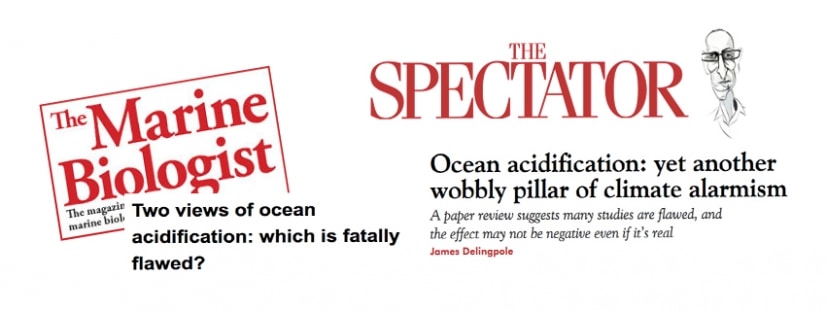The Spectator is one of the oldest English language magazines on the planet, established in London in 1828. Chances are if you’ve never read it, you’ve probably heard of it.
The Marine Biologist magazine, on the other hand, was only launched in 2013. With no disrespect to the good people there, chances are you’ve neither heard of it, read it or are aware of its very existence.
But earlier this week the Marine Biologist’s website published an eviscerating 2,500-word analysis of an April column that had appeared in The Spectator.
The column, written by climate science denier and polemicist James Delingpole, had tried to claim the science linking the burning of fossil fuels to the acidification of our oceans was “fatally flawed”.
Marine life, claimed Delingpole, had “nothing to fear” from ocean acidification.
Published back in April, Delingpole strung together what must, to some, have seemed a compelling narrative.
He had citations, “experts” and more scientific terminology than you could shake a stick at (or a copy of Marine Biologist, if you had one handy).
The problem?
“Almost everything that could be factually wrong, is wrong,” wrote Dr Phillip Williamson, on the website of your new favourite magazine, the Marine Biologist.
Blow-by-Blow Debunking
Williamson, based at the University of East Anglia, is the science director of the UK government-funded Ocean Acidification Research Programme. He responded to Delingpole’s 1,200 words with 2,400-words of his own — a blow-by-blow debunking pulling apart each argument and technique Delingpole had used.
Williamson’s analysis shows how Delingpole had employed many of the tricks and failings of climate science denialists.
He had cherry-picked data. He chose to rely on “experts”, such as fossil fuel advocates and climate science denialists Craig Idso, Patrick Moore and Matt Ridley, who had no genuine expertise in marine science.
The genuine experts Delingpole did cite, wrote Williamson, were misrepresented.
One of those experts was Dr Howard Browman, of the Institute of Marine Research in Norway, who Delingpole claimed had published “a review in the ICES Journal of Marine Science of all the papers published on the subject” and had come to a damning conclusion that many studies were flawed.
Except six weeks before, Browman had told DeSmog that his views on the issue, reported in The Times, had actually been misrepresented.
Williamson told DeSmog that he had tried, and failed, to get The Spectator to publish his views, telling editor Fraser Nelson that Delingpole’s piece had been “willfully misleading”. He told DeSmog:
Delingpole’s statement ‘Marine life has nothing whatsoever to fear from ocean acidification’ summarises his view. But that assertion is as incorrect as the opposite, purported claims that he quotes and dismisses: for example, that ocean acidification will “turn our oceans into a barren zone of death”.
The whole article is based on that false dichotomy, between unidentified alarmists and scientifically-naïve optimists who also happen to be climate change deniers and sceptics. It may seem boring to say that the truth lies between the two, but it does.
DeSmog also tried to contact The Spectator’s editor, but got no response.
In his debunking, Williamson criticised Delingpole’s use of material from the Frontier Centre for Public Policy and written by coal-funded Canadian climate science denialist Patrick Moore.
Wrote Williamson: “Moore’s FCPP paper has not been subject to expert scrutiny. If it had been, its scientific naivety and ‘cherry-picking’ approach would have precluded its publication in a reputable journal.”
Moore’s views on ocean acidification have been previously debunked by a group of scientists, who described them as “misleading” and “Ill-informed”.
Delingpole also attacked the £12m of government funding going to Williamson’s program, saying the whole issue “could have been resolved, for next to nothing, after a few hours’ basic research?”
That’s right. Delingpole thinks he can understand the entire field of ocean acidification science with only a few hours Googling.
Williamson pointed out how the £12m in funding was about the same cost as a “top-of-the-range flat in central London” or two-hours worth of spending from the Ministry of Defence.
‘Scientific Abuse’
As a final gambit, Delingpole tried to suggest that concerns over the impacts of ocean acidification had been manufactured around the year 2000 because global temperatures hadn’t been rising and so “alarmists” needed a “fallback”.
“The conspiratorial linkages surmised by Delingpole are imaginary,” writes Williamson, explaining the actual reasons for the increase in scientific interest in ocean acidification.
Williamson concluded : “On the basis of the incomplete and incorrect information presented by Delingpole, his own article provides much more impressive evidence for scientific abuse and distortion than anything communicated by ocean acidification researchers.”
Williamson told DeSmog: “Whilst The Spectator does not therefore seem to take very seriously its commitment to ‘uphold strict standards of accuracy’, I would agree that it publishes a ‘quality of argument’ not found in any other publication. Unfortunately , that quality does not seem to be very high.”
Subscribe to our newsletter
Stay up to date with DeSmog news and alerts






